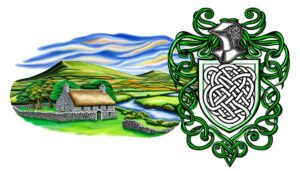Dougal Name Meaning and Origin
The name Dougal, derived from Old Gaelic, translates to 'dark stranger' and reflects historical encounters between Gaelic populations and Norse Viking invaders. Rooted in the Gaelic elements 'dubh' (dark) and 'gall' (foreigner or stranger), Dougal signifies the rich interplay of cultural influences during periods of Norse incursions in Scotland and Ireland.
Historically, this nomenclature illustrates the descriptive practices of ancient Gaelic societies, emphasizing external influences and sociocultural dynamics. Variations like 'Douglass' and 'Dugald' further highlight the linguistic evolution and adaptation over time.
Exploring these facets reveals deeper insights into the name's etymology and historical context.

Key Takeaways
- Dougal originates from the Gaelic elements 'dubh' (dark) and 'gall' (stranger).
- The name means 'dark stranger,' often referring to Norse Vikings.
- It reflects historical interactions between Gaelic populations and Norse invaders.
- Variations of Dougal include Douglass, Dugald, and Doyle.
- Famous Doulgas include mountaineer Dougal Haston and author Dougal Dixon.
Gaelic Roots of Dougal
Rooted in the rich tapestry of Gaelic culture, the name Dougal derives from the Old Gaelic elements 'dubh,' meaning dark or black, and 'gall,' denoting a stranger or foreigner.
This etymological composition reflects a historical narrative where the Gaelic-speaking inhabitants of Scotland and Ireland encountered Norse Viking invaders, who were often characterized by their darker appearance compared to the native Celts.
The amalgamation of 'dubh' and 'gall' encapsulates the complex interplay between native populations and foreign entities in early medieval Gaelic societies.
Analyzing the name Dougal linguistically, it serves as a testimony to the intricate cross-cultural interactions and the significant impact of Norse incursions on Gaelic identity and nomenclature, preserving a fascinating chapter of historical interrelations.
Meaning of Dougal
The name Dougal, rooted in Gaelic etymology, translates to 'dark stranger,' combining the elements 'dubh' (dark) and 'gall' (stranger or foreigner).
This nomenclature carries historical significance, often referring to Norsemen or Vikings who settled in Gaelic-speaking regions.
Understanding the linguistic and cultural contexts of this name provides insight into its historical usage and evolution over time.
Gaelic Name Roots
Derived from the Gaelic elements 'dubh,' meaning 'black' or 'dark,' and 'gall,' meaning 'stranger' or 'foreigner,' the name Dougal historically signifies 'dark stranger.'
This etymology reflects the linguistic richness of Gaelic, where compound names often carry descriptive or situational significance. The term 'dubh' has deep roots in various Celtic languages, often implying not only color but also metaphorical darkness. Meanwhile, 'gall' was used historically to denote anyone who was foreign or not of Gaelic origin.
The combination of these elements in the name Dougal depicts a vivid image, likely used to describe Norse settlers or other non-native individuals in ancient Gaelic-speaking regions. This linguistic blend underscores the cultural intermingling prevalent in historical Gaelic societies.
Dark Stranger Significance
Reflecting its Gaelic origins, the name Dougal's significance as 'dark stranger' offers a profound insight into the historical interactions between native Gaelic speakers and foreign settlers.
The term combines 'dubh,' meaning 'dark,' and 'gall,' meaning 'stranger' or 'foreigner.' This connotation likely emerged during periods of Norse and other foreign incursions into Gaelic territories.
The descriptor 'dark' may refer to the physical appearance of newcomers or their unfamiliar cultural practices. Linguistically, the name encapsulates a blend of awe and wariness that Gaelic communities might have felt towards these outsiders.
Therefore, Dougal serves as a linguistic artifact, reflecting both the external influences and internal perceptions that shaped the social and historical fabric of Gaelic-speaking regions.
Historical Contexts and Usage
In examining the historical contexts and usage of the name Dougal, one must consider its roots in the Gaelic language and its relevance during periods of significant cultural and social upheaval. Originating from the Gaelic elements 'dubh' meaning 'dark' and 'gall' meaning 'stranger,' Dougal was often used to describe Vikings who settled in Scotland and Ireland.
This name held particular significance during:
- Viking Invasions (8th-11th centuries) – Reflecting the interactions between Norse invaders and native populations.
- Medieval Period – Used among Scottish clans, symbolizing heritage and identity.
- Modern Revival (19th-20th centuries) – A resurgence in Celtic cultural pride and interest in Gaelic names.
Understanding Dougal's historical usage offers insights into broader sociocultural dynamics.
Historical Significance
The name Dougal, rooted in Gaelic tradition, holds historical significance that dates back to the early medieval period in Scotland and Ireland. Derived from the Gaelic elements ‘dubh’ meaning ‘dark’ and ‘gall’ meaning ‘stranger’ or ‘foreigner,’ Dougal likely referred to Norse settlers who had distinct physical characteristics and cultural practices. The name’s etymology suggests a connection to the rugged landscapes of Scotland and Ireland, where such identities were deeply intertwined with the land and its inhabitants. Over time, individuals bearing the name Dougal may have played significant roles in their communities, contributing to the rich tapestry of local lore and heritage. In exploring the donnelly name significance and history, one can find parallels in the narratives shaped by these early Gaelic names, reflecting the complexity and depth of cultural identity in the region.
This nomenclature reflects the interactions between the native Celtic populations and Viking invaders during the 9th and 10th centuries. The use of Dougal as a personal name and clan designation underscores the complex socio-political landscape of the time, marked by alliances and conflicts.
The name's endurance through centuries highlights its deep-rooted cultural resonance and its role in the historical narrative of Gaelic and Norse relations.
Dougal in Mythology
Beyond its historical significance, the name Dougal also features prominently in Gaelic mythology, where it is often associated with legendary figures and tales that have shaped cultural narratives for centuries. This rich mythological tapestry underscores the cultural depth and significance of the name Dougal.
Here are three notable aspects:
- Heroic Archetypes: Dougal often appears as a heroic figure in ancient Celtic sagas, representing bravery and leadership.
- Mythical Kinship: The name is linked to figures who are considered descendents of gods or legendary ancestors, emphasizing divine connection.
- Cultural Symbolism: In folklore, Dougal is frequently a symbol of the quintessential Gaelic warrior, embodying the values and virtues celebrated in Celtic tradition.
These elements highlight the enduring mythological resonance of the name.
Popularity Over Time
The name Dougal has experienced fluctuating popularity over the centuries, influenced by historical events and cultural shifts.
Particularly, its prevalence has varied considerably across different geographic regions, with particular strongholds in Scotland and Ireland due to its Gaelic roots.
A linguistic analysis reveals that the name's popularity often correlates with periods of heightened interest in Celtic heritage and mythology.
Historical Popularity Trends
Over the centuries, the name Dougal has experienced fluctuating levels of popularity, reflecting broader cultural and historical shifts. Its usage trajectory can be analyzed in several key periods:
- Medieval Era:
The name Dougal saw significant use during the early medieval period, particularly in Gaelic-speaking regions, due to its Celtic origins and association with notable historical figures.
- 19th Century:
There was a resurgence of interest in traditional Gaelic names, including Dougal, during the 19th-century Celtic Revival, a cultural movement that sought to celebrate and preserve Gaelic heritage.
- Modern Times:
In contemporary settings, the name Dougal is less common but retains a niche appeal, often chosen for its historical resonance and cultural significance in Scottish and Irish communities.
These trends illustrate Dougal's enduring, albeit variable, popularity.
Geographic Popularity Differences
Various geographic regions exhibit distinct patterns in the popularity of the name Dougal, influenced by historical migrations, linguistic traditions, and cultural exchanges. The name's prevalence in Scotland can be traced back to Norse-Gaelic interactions, while its sporadic usage in Ireland reflects different historical dynamics. In contrast, Dougal's presence in the United States is often attributed to Scottish immigrants during the 19th and early 20th centuries.
| Region | Historical Influence | Current Popularity |
|---|---|---|
| Scotland | Norse-Gaelic interactions | Moderately common |
| Ireland | Historical migrations | Rare |
| United States | Scottish immigration | Uncommon |
| Australia | British colonial era | Rare |
| Canada | Scottish and Irish immigration | Moderately rare |
This table highlights how factors like migration and cultural transmission have shaped Dougal's varying prominence across regions.
Famous People Named Dougal
Renowned for their contributions across various fields, individuals named Dougal have left an indelible mark on history and culture. Historically, the name Dougal has been borne by notable figures whose achievements span diverse disciplines, thereby enriching the legacy associated with this name.
- Dougal Haston (1940-1977): A Scottish mountaineer and author, Haston was instrumental in pioneering routes on some of the world's most challenging peaks, including the Eiger and Everest.
- Dougal Dixon (b. 1947): A British geologist and author, Dixon is acclaimed for his speculative evolution books that explore hypothetical scenarios of future life forms.
- Dougal Butler: Known for his role as the personal assistant to Keith Moon of The Who, Butler authored 'Full Moon,' a memoir providing unique insights into the rock star's life.
These individuals epitomize the diverse and impactful legacy of the name Dougal.
Variations of Dougal
The name Dougal has several variations that have evolved over time, reflecting different linguistic and cultural influences.
Historically, the name derives from the Gaelic 'Dubhghall,' where 'dubh' means 'dark' or 'black,' and 'gall' signifies 'foreigner' or 'stranger.'
Variations include 'Douglass,' a more Anglicized form, and 'Dugald,' a common Scottish adaptation.
In Ireland, 'Doyle' emerged as a derivative, retaining the original meaning but adapting to local phonetics.
The Norse influence is evident in 'Dugall,' used in the Hebrides.
Each variation encapsulates the phonological and orthographic shifts influenced by regional dialects and historical interactions.
Understanding these variations provides insight into the migratory patterns and cultural exchanges that shaped the name's evolution.
Dougal in Literature
In literary contexts, the name Dougal frequently appears as a character name that evokes a sense of rugged individuality and cultural heritage, often reflecting its Gaelic origins. The name's etymological roots in the Gaelic elements 'dubh' (dark) and 'gall' (stranger) suggest a character imbued with an enigmatic or outsider quality. Historically, this has made Dougal a compelling choice for authors seeking to convey complexity.
- Historical Novels:
Dougal often appears in narratives set in Scotland, reinforcing themes of national identity and heritage.
- Fantasy Literature:
Characters named Dougal are frequently depicted as warriors or adventurers, emphasizing the name's robust and enduring qualities.
- Modern Fiction:
The name is used to create a connection to cultural roots and evoke a timeless, yet relatable, persona.
Choosing Dougal Today
Selecting the name Dougal today involves appreciating its rich Gaelic heritage and the nuanced meanings that have evolved over centuries. Originating from the Gaelic 'Dubhghall,' meaning 'dark stranger' or 'foreigner,' Dougal encapsulates historical circumstances where Norse and Gaelic cultures intersected.
This name carries significant historical weight, evoking eras of Viking influence in Scotland and Ireland. Linguistically, Dougal is a compound of 'dubh' (dark) and 'gall' (foreigner), reflecting a descriptive nomenclature prevalent in ancient Gaelic societies.
Choosing Dougal today is not merely a preference for an uncommon name but a deliberate nod to a storied past and cultural synthesis. It signifies an appreciation for heritage, etymology, and the historical interplay of identities across the Celtic and Norse worlds.
Conclusion
In summation, the name Dougal, steeped in Gaelic heritage, embodies a rich tapestry of historical and cultural significance. Its etymology reflects deep-rooted meanings, while its presence in mythology and literature underscores its enduring appeal.
The evolution of Dougal over time, alongside its various forms and notable bearers, highlights a name that is as versatile as it is timeless. Consequently, the choice of Dougal today not only honors tradition but also embraces a legacy of profound resonance.






